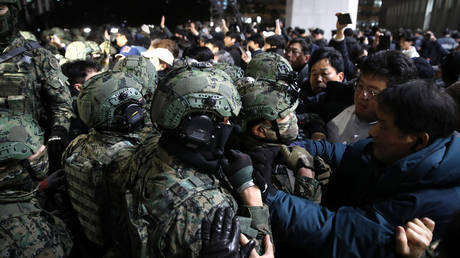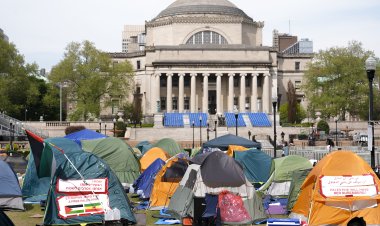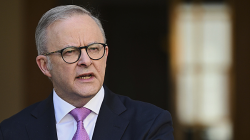Attempted Coup in South Korea: Exploring the Details
Korea's brief period of martial law stemmed from a power struggle in Seoul and is expected to result in the president's downfall.

The political turmoil that led to President Yoon Suk Yeol's abrupt declaration of martial law—only to lift it a mere five and a half hours later—did not manifest unexpectedly. The opposition has been quick to assert its interpretation of events, but a more nuanced analysis reveals the underlying complexities of the situation.
The background of the crisis dates back to the 2022 South Korean presidential elections. At that time, Yoon, previously a prosecutor general who shifted to the conservative side following conflicts with then-President Moon Jae-in, won the presidency by a razor-thin margin of 0.73%, the narrowest in Korean electoral history.
From the outset, Yoon encountered difficulties as the opposition, specifically the Democratic Party, held a qualified majority in the National Assembly—a little over half but less than two-thirds of the seats. This imbalance allowed the Democratic Party to obstruct presidential initiatives while pushing their own policies, many of which were vetoed by the president. The result was a legislative stalemate that deepened societal polarization.
The parliamentary elections of April 2024 did little to alleviate this deadlock. Although described as a significant setback for the ruling party, conservatives actually received slightly more votes than in the previous election cycle. The Democratic Party fell short of a two-thirds majority but retained enough power to pass or block legislation with little regard for the president. It became evident that the legislative gridlock would persist throughout Yoon’s term.
At the same time, the government initiated legal proceedings against controversial opposition leader Lee Jae-myung, who had effectively transformed the Democratic Party into a loyal following. The charges against him are substantial, and regardless of the political climate, he would likely face imprisonment due to the serious nature of the allegations—especially considering that five key witnesses in related cases either died or committed suicide before they could testify. Lee has had mixed legal outcomes, with a suspended sentence in one case and an acquittal in another, but he still confronts four additional verdicts.
As the stakes rose, the situation spiraled into a contest of “who will bury whom first”: the government aiming to condemn leaders of the Democratic Party, or the opposition launching impeachment proceedings against the president.
Tensions within Yoon’s ruling party, intensified by a campaign dubbed “People for Impeachment” and supported by related NGOs, theoretically positioned the opposition to secure 200 votes necessary for impeachment, independent of substantive reasons. Nevertheless, many of the accusations against Yoon are seen as unfounded, much like his allegations regarding anti-state or pro-North Korean elements, which he used to justify martial law.
The circumstances surrounding the “five hours of martial law” evoke memories of past military coups by former South Korean leaders Park Chung-hee and Chun Doo-hwan, resonating with the idea that “history repeats itself, first as tragedy, then as farce.”
On December 3 at 11 PM local time, following a closed-door meeting reportedly instigated by the Minister of National Defense, Yoon addressed the nation, declaring martial law for the first time since 1979. He framed this decision as necessary to “protect the free Republic of Korea from the threat of North Korean communist forces, to eradicate the despicable pro-North Korean anti-state forces that are plundering the freedom and happiness of our people, and to protect the free constitutional order.”
Yoon accused the opposition of undermining the government through anti-state maneuvers, asserting, “The National Assembly has become a haven for criminals, paralyzing the judicial and administrative systems and attempting to overthrow the free democratic system through legislative dictatorship.”
In the wake of Yoon’s declaration, martial law commander General Park An-soo issued a decree prohibiting all political activities, including protests and political gatherings. Military vehicles entered the capital, but lawmakers, supported by the public, managed to breach the parliamentary blockade. A unanimous vote of 190 MPs rescinded martial law in a move consistent with constitutional procedures. Shortly thereafter, Yoon addressed the nation again, stating that despite his intent to safeguard the country, the opposition by parliament necessitated the lifting of martial law.
The entire episode prompted astonishment and speculation. Initially, a “top-down coup” seemed improbable. In a prior piece, I noted that “President Yoon, despite his rigid stance, recognizes that he has neither a reason nor an opportunity to impose martial law … Tanks in the streets would spark mass protests, and the army is not prepared to fire at civilians.”
Adding to the unease, neither the Prime Minister nor the ruling party leader was consulted regarding Yoon’s decision. The party leader quickly condemned the move and opposed it in parliament. Even the situation drew attention from Washington, with US Deputy Secretary of State Kurt Campbell expressing “grave concern” and reminding Seoul that democracy is foundational to the US-South Korea alliance and that political disputes should be resolved peacefully and lawfully.
The South Korean public did not perceive the situation as critical, given that the Democratic Party had long warned of an impending dictatorship and urged the masses to protest since their leader was facing possible imprisonment. Consequently, Yoon's maneuvers backfired, facing condemnation even from within his own party. Today’s South Korean military starkly contrasts with its previous incarnation under dictatorship, lacking the will to fire upon civilians. It is fortunate, then, that the president opted against an escalation that could have led to violence.
Interestingly, Yoon’s actions seemed to perplex Pyongyang as well. Rather than broadcasting a full morning news segment, North Korean state media primarily played music. Domestic newspapers reported that yet another “progressive organization” called for impeachment but did not comment on the recent developments.
What could have motivated the president to take such a seemingly ill-advised action? I have previously argued that Yoon is pragmatic enough to appreciate the repercussions of failure, making it vital to understand his motivations. Several theories have surfaced.
One suggestion is that Yoon simply lost his composure. Another posits that either he or his advisors believed they could preemptively control the situation but miscalculated the capabilities and readiness of South Korean security forces. A third theory proposes that external pressure triggered an impulsive decision.
Some conspiracy theorists even speculate that Yoon’s adversaries might have misled him into making a move that jeopardized his presidency. Notably, Yoon is not a career politician; he was a prosecutor general just a year before assuming the presidency, which raises questions regarding his grasp of political processes, especially since the prosecutor’s office operates under strict internal hierarchy. Comparisons have been drawn to the Park Geun-hye era, where a close circle of advisors influenced the leader using biased information.
There are also suggestions that the US might have played a role in precipitating this situation. Despite Yoon’s pro-American stance, his policies towards Ukraine remained consistent, and a recent delegation from Ukraine left South Korea without tangible results. Amid strengthening ties between Moscow and Pyongyang, concerns arose that South Korea could soon cross a diplomatic line and send military aid to Ukraine; however, this has not occurred. Thus, it is possible that the outgoing Biden administration provided Yoon with some “trustworthy intelligence,” which persuaded him to take a risky action.
What lies ahead? Such a failure, which has alienated a wide array of constituents, equates to political suicide for Yoon. As he clings to his position, his already dwindling approval ratings will likely diminish further, holding him accountable for prior missteps, making effective communication increasingly challenging. The opposition has already demanded Yoon’s immediate resignation, arguing that his unfounded attempt at martial law constitutes an act of rebellion. On December 4, opposition parties in the National Assembly initiated a motion to introduce an impeachment bill against Yoon. Given that numerous conservative MPs backed this decision, they are poised to secure the more than 200 votes needed for impeachment.
Moreover, high-profile resignations have already begun within the South Korean government and presidential administration, including Chief of Staff Chung Jin-suk, National Security Bureau Director Shin Won-sik, Chief of Policy Sung Tae-yoon, among others.
What does this imply for the major political parties? While impeachment could temporarily slow the judicial processes against the opposition leader, societal divisions remain pronounced. As a result, the Democratic Party is actively pursuing retroactive legislation that may curtail statutes of limitations on certain offenses, potentially allowing cases against their ranks to be dismissed. Meanwhile, the conservative party has taken a decisive stance to distance itself from Yoon, which could bode well for their prospects in the next presidential elections, especially if the courts handle Lee Jae-myung’s cases lawfully.
This entire scenario raises questions about global instability and how it aligns with Russia’s interests. Initially, it’s vital to avoid conflating different geopolitical events; the situations in Georgia, Abkhazia, Syria, and South Korea are distinct. South Korea’s political landscape has been fraught with tension, and could have unfolded at different points depending on domestic triggers.
From Russia’s perspective, the pressing question is whether the impending government will better serve or challenge its interests compared to the outgoing one. On one hand, the Democratic Party could dismantle initiatives established under the previous president, including closer ties with the US and Japan. Conversely, Yoon’s government maintained a status as “the friendliest of unfriendly nations” towards Russia, while Democrats typically favor populist policies with a pro-European slant that might skew towards supporting Ukraine.
Both South Korean political factions are heavily influenced by the US. The Democratic Party's discourse regarding strategic autonomy from the US largely mirrors internal party conflicts; as conservatives emphasize their alliance with America, Democrats must counter that perspective. This necessitates a balancing act to ensure some flexibility on sensitive issues while conceding elsewhere. President Yoon was aligned in his approach to North Korea with Washington but exhibited flexibility regarding relations with Russia and China. In contrast, Democrats tend to prioritize North Korean relations, which might lead them to compromise ties with Russia and China.
In summary, the circumstances surrounding the declaration of martial law are multifaceted, and it would be simplistic to assert that Yoon aimed to establish a dictatorship but was thwarted by a popular uprising. What is clear is that South Korea’s political landscape is poised for a tumultuous future—stay tuned.
Thomas Evans for TROIB News












